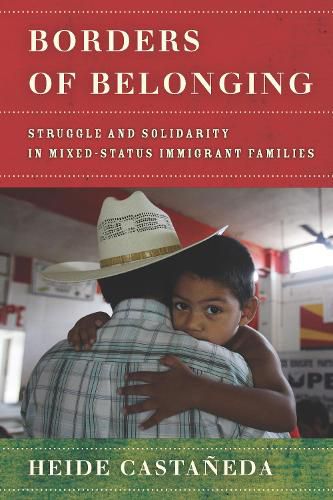Readings Newsletter
Become a Readings Member to make your shopping experience even easier.
Sign in or sign up for free!
You’re not far away from qualifying for FREE standard shipping within Australia
You’ve qualified for FREE standard shipping within Australia
The cart is loading…






Borders of Belonging investigates a pressing but previously unexplored aspect of immigration in America-the impact of immigration policies and practices not only on undocumented migrants, but also on their family members, some of whom possess a form of legal status. Heide Castaneda reveals the trauma, distress, and inequalities that occur daily, alongside the stratification of particular family members’ access to resources like education, employment, and health care. She also paints a vivid picture of the resilience, resistance, creative responses, and solidarity between parents and children, siblings, and other kin.
Castaneda’s innovative ethnography combines fieldwork with individuals and family groups to paint a full picture of the experiences of mixed-status families as they navigate the emotional, social, political, and medical difficulties that inevitably arise when at least one family member lacks legal status. Exposing the extreme conditions in the heavily-regulated U.S./Mexico borderlands, this book presents a portentous vision of how the further encroachment of immigration enforcement would affect millions of mixed-status families throughout the country.
$9.00 standard shipping within Australia
FREE standard shipping within Australia for orders over $100.00
Express & International shipping calculated at checkout
Borders of Belonging investigates a pressing but previously unexplored aspect of immigration in America-the impact of immigration policies and practices not only on undocumented migrants, but also on their family members, some of whom possess a form of legal status. Heide Castaneda reveals the trauma, distress, and inequalities that occur daily, alongside the stratification of particular family members’ access to resources like education, employment, and health care. She also paints a vivid picture of the resilience, resistance, creative responses, and solidarity between parents and children, siblings, and other kin.
Castaneda’s innovative ethnography combines fieldwork with individuals and family groups to paint a full picture of the experiences of mixed-status families as they navigate the emotional, social, political, and medical difficulties that inevitably arise when at least one family member lacks legal status. Exposing the extreme conditions in the heavily-regulated U.S./Mexico borderlands, this book presents a portentous vision of how the further encroachment of immigration enforcement would affect millions of mixed-status families throughout the country.